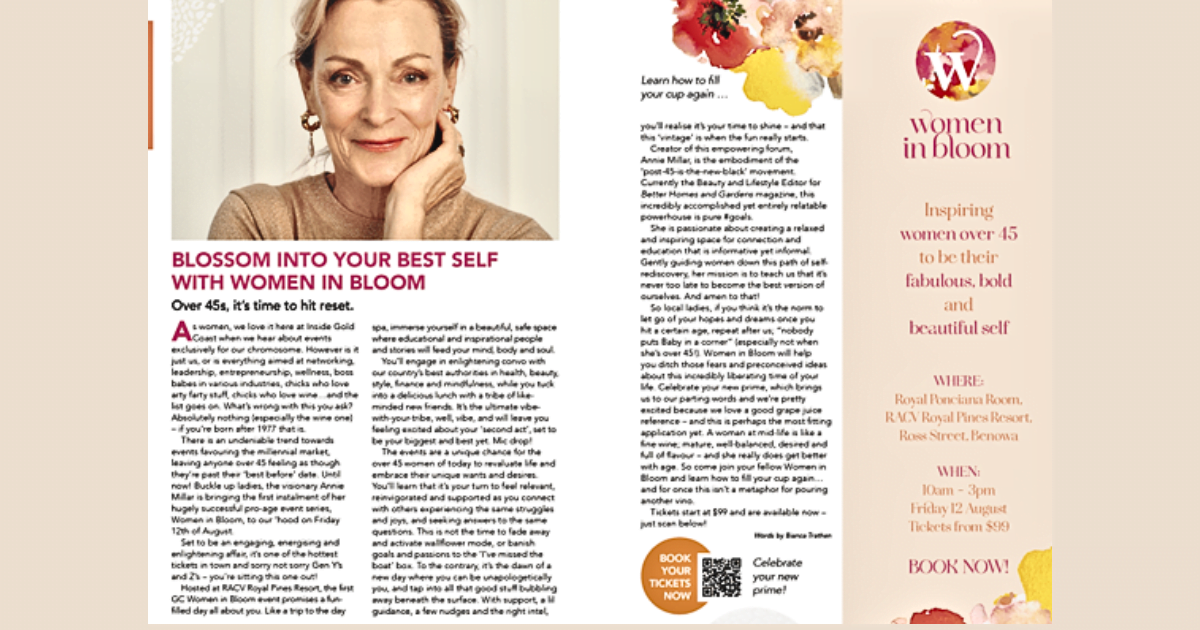By Annie Millar
Published in The Smart Company July 03 2024
In a society that champions diversity and inclusion, it’s concerning that The Australian Seniors Series: Gen Seen Report 2024 reveals that ageism remains a pervasive issue in Australian workplaces. According to their results, over three-quarters (76%) of Australians acknowledge the presence of ageism in their work environments.
Perhaps more alarmingly, more than two in five (42%) individuals feel less visible at work after turning 50. As business leaders, it’s imperative to address this issue head-on and foster a culture of inclusivity and respect.
Feeling undervalued, having efforts going unnoticed and being overlooked for job opportunities, promotions and pay rises, is not only detrimental to the older workforce, but also promotes a negative culture that can permeate the entire organisation.
Interestingly, 29% of over-50s claim that social media is where they are most likely to experience ageism. The perception is fueled by social media interactions where ageist remarks like ‘OK Boomer’ are common.
This social statistic alone, highlights the role and strategies that workplaces can embrace to counteract these negative stereotypes.
Leadership Sets the Tone: Leverage Wisdom and Experience
Inclusivity needs to be championed from the top; when leaders fail to value older adults, it sends a message to the rest of the workforce that ageism is acceptable.
When leaders demonstrate active support and engagement with their more experienced employees, it promotes a cultural shift that can significantly influence the behaviour and attitudes of younger employees. This creates an environment where appreciation and respect for all age groups is embedded into the workplace ethos.
Contrary to outdated stereotypes, many older adults are in their professional prime during their 50s. They possess a unique blend of experience, stability, and dedication that can significantly benefit their organisations. Nearly 1 in 3 (32%) over-50s report feeling their happiest post-50, attributing it to the peak of wisdom and life experience (28%) along with life satisfaction (28%).
Recognising that older employees bring a wealth of wisdom and life experience to the table; and utilising those invaluable resources effectively is a smart business decision.
Promoting Intergenerational Collaboration
The report revealed that 55% of over-50s believed Gen Z are the worst ‘ageist’ offenders.
Just as older employees can feel ‘invisible’ in the workplace, some younger employees can sometimes feel intimidated by their older colleagues. So creating a supportive environment where open communication and mutual respect are encouraged can counteract these perceptions and level expectations.
Regular team-building activities and inclusive policies can help break down these barriers, fostering a workplace where everyone feels comfortable and valued. One powerful approach is to establish mentorship programs where older employees can share their knowledge and experience with younger colleagues. This offers the double-edged effect of empowering older employees seeking value in their roles and helps bridge generational gaps to foster stronger, more collaborative working relationships across teams.
A perceived decline in respect for elders (69%) is driving a wedge between the senior community and younger generations, particularly online.
The key to breaking down barriers and fostering inclusivity is to ensure that different generations within the workplace are not working in silos.
Creating opportunities for intergenerational collaboration can yield significant benefits. Whether through mixed-age project teams, cross-generational workshops, or social events, these initiatives can promote understanding and cooperation, and break down the stereotypes between age groups.
Empowerment Through Upskilling and Combatting Skills Shortages
The rapidly evolving digital landscape means it’s essential to keep our skills up-to-date. Negative stereotypes like limited technological skills (56%), resistance to change (47%), and difficulty adapting to new trends (44%) are widespread.
Offering upskilling opportunities to older employees, particularly in areas such as digital literacy, can be incredibly empowering. Opportunities not only enhance confidence and competence, but signals that the business values their continued contribution and development. This investment in their growth can lead to greater job satisfaction and loyalty.
In many industries, losing the expertise and stability that older employees provide would be detrimental. Tapping into the vast reservoir of skills and experience that older employees possess can also assist addressing the skills shortage that many industries face.
Upskilling and re-engaging older employees not only makes them feel valued and secure, it’s a cost effective and practical measure to retain your critical talent pool. It mitigates the need for extensive recruiting and training of new employees.
Recognise and Reward Contributions
Almost a quarter (24%) of over-50s pinpoint the ages between 50-54 as the most notable shift in their visibility at work.
Recognition is a fundamental human need for everyone, and older employees are no exception. It’s vital for employers to actively acknowledge and reward the contributions of their older staff.
Whether it’s through promotions, pay rises, mentorship programs, or public recognition, these gestures go a long way in making employees feel valued and appreciated. Promoting from within rather than consistently bringing in younger employees over seasoned staff members can also help maintain morale and motivation.
Dismantling Ageism: A Societal Shift
The report also sheds light on the broader issues of ageism.
An overwhelming 90% of over-50s feel they face stereotypes about their age, 81% believe ageism is prevalent in society, and the media often exacerbates the stereotypes.
To bridge this gap, fostering empathy and understanding across generations is crucial, and organisations as a whole have a valuable role.
Considering close to 57% of over-50s believe they are yet to hit the prime of their lives, and are embracing their age with resilience, employers can only benefit from harnessing the positive outlook. Creating environments that value older, more experienced employee contributions, supports wellbeing, and enhances the culture of the workplace to benefit everyone.
Addressing ageism in the workplace is not just a moral imperative but also a strategic one. It’s time for leaders to step up, lead by example, and create a truly inclusive workplace where all employees, regardless of age, feel visible and valued.



